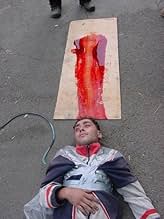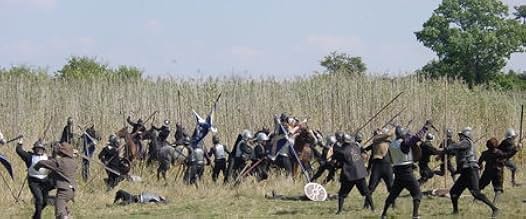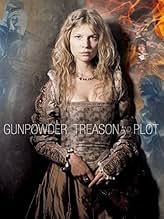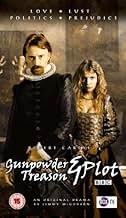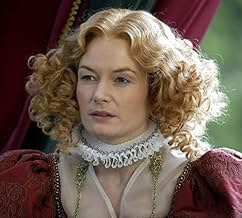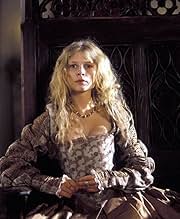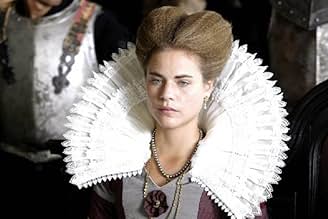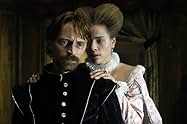Maria Stuart - Blut, Terror und Verrat
Füge eine Handlung in deiner Sprache hinzuMini series depicting the turbulent and bloody reigns of Scottish monarchs Mary, Queen of Scots and her son King James VI of Scotland who became King James I of England and foiled the Gunpow... Alles lesenMini series depicting the turbulent and bloody reigns of Scottish monarchs Mary, Queen of Scots and her son King James VI of Scotland who became King James I of England and foiled the Gunpowder Plot.Mini series depicting the turbulent and bloody reigns of Scottish monarchs Mary, Queen of Scots and her son King James VI of Scotland who became King James I of England and foiled the Gunpowder Plot.
- Auszeichnungen
- 4 wins total
Empfohlene Bewertungen
Notable historical biopic about Mary Stuart and her confrontation with Elizabeth Tudor and other enemies. A decent and intelligent biography, lavishly produced by BBC and well directed by Gillies MacKinnon, although they are somewhat inappropriate when some roles speak to the camera. The cast was convincingly led by Clémence Poésy as the condemned Mary, Queen of Scots and Catherine McCormack as the cunning, Elizabeth I, as well as Robert Carlyle as the ruthlessly ambitious king James VI of Scotland and I of England.
Adding gorgeous costume design, stunning settings and production design. This turns out to be a typical British historical drama in which Clémence Poésy in the lead role and Catherine McCormack as her contender are finely cast. The excellent and large cast with prestigious British actors performing quite well through at an evocative historical set. The riots, loves and power struggles of his time are splendidly recreated here, including the most troubled days and the machinations that surrounded them.
The plot summary of the series made up of two parts in approximately 100 minutes each is the following: 1ª After the death of her husband Francis II of France in 1560, Mary, Queen of Scots (Clémence Poésy), is invited by the Queen Mother Catherine De Medici to leave the country and so it comes back to the homeland, her natal Scotland. As in neighboring England, many members of the nobility have embraced the Protestant faith. Additionally, the Catholic Mary has to deal with her Protestant and illegitimate half-brother James Stewart (Steven Duffy), Lord Moray's ruling ambition. Fearing that Mary has ambitions for the throne of England, Elizabeth I of England decides to weaken her claim by sending her favorite, the ambitious Robert Dudley , to court and marry Mary. Elizabeth also sends the young and pampered Lord Darnley (Paul Nicholls), from a powerful Catholic family. Tempted by the handsome Darnley, Mary impulsively chooses him to marry. Moray opposes the marriage, but Mary ignores him. But later on, May falls in love for Bothwell (Kevin McKidd), while the anger of the Protestant priest John Knox (Gary Lewis) increases.
2º-James (Robert Carlyle) was the son of Mary, Queen of Scots, and a great-great-grandson of Henry VII, King of England and Lord of Ireland, and thus a potential successor to all three thrones. He acceded to the Scottish throne at the age of thirteen months, after his mother was forced to abdicate in his favour. Four regents governed during his minority, which ended officially in 1578, though he did not gain full control of his government until 1583. King of England and Ireland as James I from the union of the Scottish and English crowns on 24 March 1603 until his death in 1625. Although he long tried to get both countries to adopt a closer political union, the kingdoms of Scotland and England remained sovereign states, with their own parliaments, judiciaries, and laws, ruled by James in personal union. In 1589, he married Anne of Denmark. Three of their children survived to adulthood: Henry Frederick, Elizabeth, and Charles. In 1603, James succeeded his cousin Elizabeth I, the last Tudor monarch of England and Ireland, who died childless. He continued to reign in all three kingdoms for 22 years, a period known as the Jacobean era, until his death in 1625. After the Union of the Crowns, he based himself in England from 1603, returning to Scotland only once, in 1617, and styled himself "King of Great Britain and Ireland". He advocated for a single parliament for England and Scotland. In his reign, supported by adviser Sir Cecil (Tim McInnerny), the Plantation of Ulster and English colonisation of the Americas began. At 57 years James's reign in Scotland was the longest of any Scottish monarch. He achieved most of his aims in Scotland but faced great difficulties in England, including the Gunpowder Plot (1605) in which conspiracy took place whereby rebels led by Guy Fawkes (Michael Fassbender), Catesby (Richard Coyle) attempted to blow up the English Parliament.
This interesting historical drama contains evocative cinematography that adds color to the atmosphere, as well as sensitive and attractive musical score, being efficiently directed. Other films that deal with these famous Queens are the following: ¨Mary of Scotland¨1936 by John Ford with Katharine Hepburn, Fredric March. ¨Elizabeth¨ (1998) by Shekar Kapur with Cate Blanchet, Joseph Fiennes. "Mary Queen of Scots" (2018) with Saoirse Ronan, Margot Robbie, Adrian Lester, Guy Pearce, Joe Alwyn, Gemma Chan. And TV series like ¨Elizabeth R¨ (1971) by Herbert Wise with Glenda Jackson. "Elizabeth I" Series (2005) by Tom Hooper with Helen Mirren, Jeremy Irons, Hugh Dancy, Toby Jones. And "Reinas" or "Queens" (2016-2017) with Olivia Chenery, Rebecca Scott.
The series is not helped either by some substandard acting. Clemence Posey, with her bizarre French-American-Scottish accent, is mostly inaudible as Mary Queen of Scots and seems to take most of the cues for her performance from Mila Jovovitch's disastrous turn as Joan of Arc in 'Messenger'. Sira Stampe is robotic as James I's wife, while Robert Carlyle's James is as unconvincing as he is unhinged. Also detracting from our enjoyment are the understaffed battle scenes, the histrionic tone, and a decidedly anachronistic portrayal of sexuality.
Surprisingly, given McGovern's own politics, there's almost no hint of republicanism here, although within a few decades Britain was engulfed by a civil war that disputed absolutely the relevance of monarchy: perhaps this is ignored because it was a Protestant rebellion. Instead, we get a boring, linear drama of good queen Mary, bad queen Elisabeth and mad king James. I'm still certain that somewhere, behind the propaganda, there's an interesting story - how did hatred of Catholocism spread so rapidly when only a handful of years previously, everyone in England was Catholic? But this film does little to open one's eyes.
Some great performances, in particular that of Robert Carlyle as a moody, intense and utterly ruthless King James. An unrecognisable Catherine McCormack (remember Murron, William Wallace's young wife in Braveheart?) plays a scheming, all-powerful Queen Bess ("DESTROY HIM!"), whose scenes are sadly brief but memorable. Clemence Poesy, a gorgeous young French actress, gives the character of Mary a naivete and sensuality previously unseen in period pieces covering this time-frame. British audiences will recognise a now fully-grown Paul Nicholls (young Joe Wicks from Eastenders) who clearly relished his scenes playing the doomed Lord Darnley. (A possible future Bond, perhaps). Steven Duffy does well as a treacherous and highly ambitious Lord James, half-brother of Queen Mary, while Kevin McKidd lends dignity and heroism to the character of Bothwell, lover of the young Queen. Tim McInnerny is previously well-known for his comedic performances in the historical comedy Blackadder, so it was a nice change to see him as the cold, calculating Cecil, most powerful man in England.
The accuracy of certain events will no doubt be disputed by historians (the execution of Queen Mary, for example: never before have I seen it portrayed as a plot by James VI to murder his mother in order to get his own hands on the English Crown). But it is a highly enjoyable period drama whose main theme, the eternal struggle between Protestant and Catholics, is used to great effect to portray the events leading up to one of the most infamous plots in British history, commemorated every single 5th November all over these islands ever since.
The title brings to mind "Guy Fawlkes", but the mini-series is actually the story of Mary, Queen of Scots - a tale which is amongst the most dramatic in the whole of Scottish history.
Given that all Scottish school children study this period in great detail (myself included!), the responsibility of all concerned is high.
It was with great delight that I found the series an honest and compelling human drama, and the (historically known) actions of the characters made perfect sense in the light of the characterisations and script.
I was concerned that the whole affair would be dragged down by either the weight of historical authenticity or the need to create a drama for modern sensibilities.
The historical ambiguities in the character of Mary were perfectly realised as drama: the transition from a French childhood to become a champion of the Scottish cause was credible. Her involvement in political assassinations was cleverly presented as "for the good of Scotland" rather than as cold-hearted scheming. So in this drama Mary is a heroine, though historians will argue endlessly on this one. My recall of school history is not good enough to know where liberties have been taken with historical fact.
Some flaws were present - the character of David Rizzio was not fleshed out sufficiently. The feel of the production could be criticised a little as a McGovern "housing estate drama" in costume e.g. the simple-minded Protestant/Catholic vein pervading the production. However, as the drama really gets going through the romance between Mary and her "bit of Scottish rough" (Lord Bothwell), perhaps one should acknowledge the universality of the human condition.
This is not an "Elizabeth" which re-wrote the book for cinematic historical realisations. However, "Gunpowder, Treason and Plot" is a likable and worthy production, which may not be absolutely top notch, but does seem a little tucked away on BBC 2 on a Sunday evening, when it deserves wider viewing.
I await the remaining episodes with interest.
Wusstest du schon
- WissenswertesThe title is taken from the nursery rhyme about Guy Fawkes and the Gunpowder Plot. Many versions of the rhyme exist, and its origins are unclear. But most begin with these lines: "Remember, remember / the fifth of November / the Gunpowder Treason and Plot. / I know of no reason / why the Gunpowder Treason / should ever be forgot."
- PatzerAt the beginning Mary is depicted as a young, unmarried girl who had spent 13 years in exile in France. Actually, she was a widow. She had been married to the French king who had died very young.
- Zitate
Bothwell: Forgive me.
Mary, Queen of Scots: How's your head?
Bothwell: Sore.
Mary, Queen of Scots: I could remove it for you.
Bothwell: Well, that would do the trick, aye.
Mary, Queen of Scots: You caused Lord Darnley great offense, you called Lord Darnley a long streak of English piss!
Bothwell: Then I must apologize.
Lord Darnley: I thank you.
Bothwell: 'Twas English *pish*.
Lord Darnley: [pause] Banishment, I think.
Bothwell: Anywhere but France.
Top-Auswahl
Details
- Erscheinungsdatum
- Herkunftsländer
- Offizielle Standorte
- Sprache
- Auch bekannt als
- Gunpowder, Treason & Plot
- Drehorte
- Produktionsfirmen
- Weitere beteiligte Unternehmen bei IMDbPro anzeigen
Zu dieser Seite beitragen


